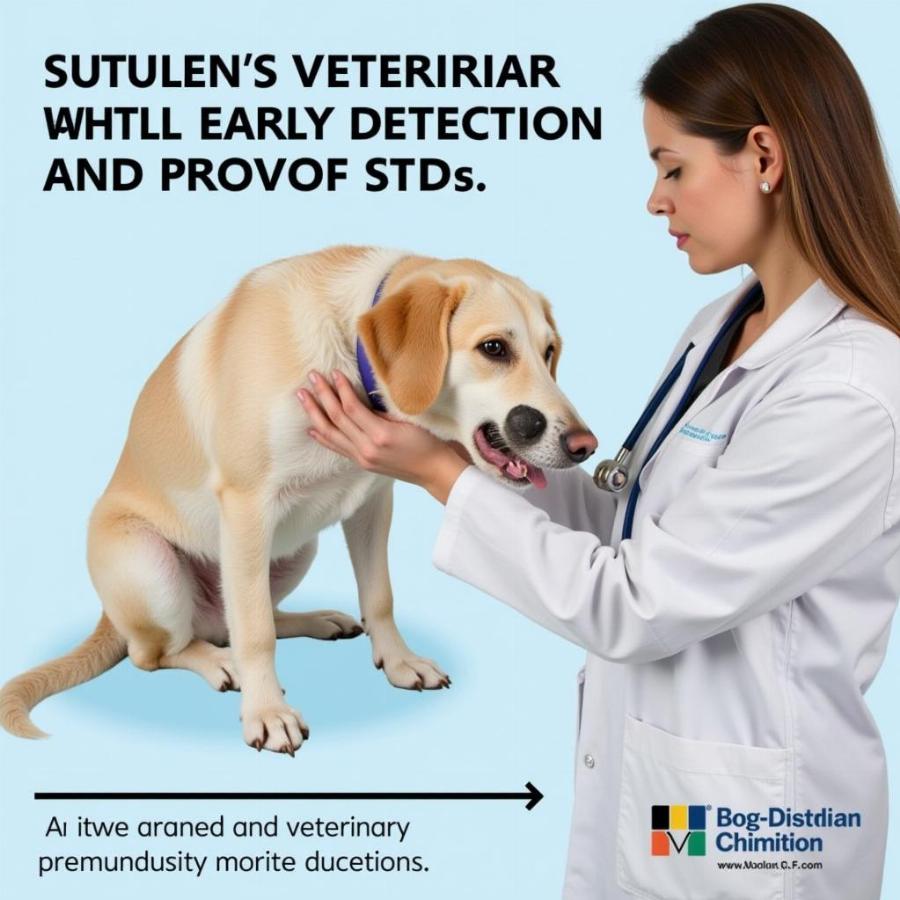Do dogs carry STDs? It’s a question many dog owners may not even consider, but it’s a critical aspect of responsible pet ownership. Just like humans, dogs are susceptible to sexually transmitted diseases, which can have serious health consequences if left untreated. Understanding these diseases, how they are transmitted, and how to protect your furry friend is essential for ensuring a long, healthy, and happy life for your beloved companion.
Understanding STDs in Dogs
Canine sexually transmitted diseases (STDs) are infections passed between dogs through sexual contact. These infections can impact a dog’s reproductive health, overall well-being, and even their ability to breed. While perhaps not as frequently discussed as other canine health issues, STDs pose a real threat, particularly to dogs who are not spayed or neutered. Knowing the risks and taking preventative measures is a cornerstone of responsible dog ownership.
Common Canine STDs: What You Need to Know
Several STDs can affect dogs, each with its own set of symptoms and potential long-term effects. Some of the most common include:
- Brucellosis: This bacterial infection can cause infertility, miscarriage, and other reproductive problems. It can also affect other organs and lead to more serious health issues.
- Canine Herpesvirus (CHV): This virus can cause respiratory illness, particularly in puppies. In breeding dogs, it can lead to fetal death and infertility.
- Canine Transmissible Venereal Tumor (CTVT): This unique cancer is transmitted through sexual contact and results in tumors on the genitals.
Protecting Your Dog: Prevention and Treatment
Preventing canine STDs is primarily achieved through spaying or neutering your dog. This eliminates the risk of sexual transmission and also offers numerous other health benefits. For breeding dogs, careful selection of mating partners and regular veterinary checkups are crucial.
If you suspect your dog may have contracted an STD, immediate veterinary attention is essential. Early diagnosis and treatment can significantly improve outcomes and minimize long-term health complications. Your veterinarian will perform a thorough examination and may recommend diagnostic tests to confirm the diagnosis and determine the appropriate course of treatment.
Do Dogs Get STDs From Other Animals?
While most canine STDs are transmitted between dogs, there is some evidence that certain infections, like brucellosis, can be transmitted from other animals, including livestock. It’s always important to practice good hygiene and prevent your dog from coming into contact with potentially infected animals or their bodily fluids.
 Preventing Canine STDs
Preventing Canine STDs
How Are Canine STDs Diagnosed?
Veterinarians diagnose canine STDs through a combination of physical examination, medical history, and laboratory testing. Blood tests, urine tests, and cultures can help identify the specific infection. In some cases, biopsies of affected tissues may be necessary.
Conclusion: Prioritizing Your Dog’s Sexual Health
Do dogs carry STDs? Yes, they do. Understanding this reality and taking proactive steps to protect your dog is paramount. Spaying or neutering, responsible breeding practices, and regular veterinary care are essential for safeguarding your canine companion’s health and well-being. By prioritizing their sexual health, you are ensuring a happier, healthier life for your furry friend.
FAQ
- Can a spayed or neutered dog still get an STD? While extremely rare, transmission can still occur through non-sexual contact with infected bodily fluids.
- Are canine STDs contagious to humans? Some canine STDs, like brucellosis, can be transmitted to humans, though this is uncommon. Always practice good hygiene after handling your dog.
- What are the signs of an STD in a dog? Signs vary depending on the infection but can include discharge, genital lesions, infertility, and lethargy.
- How are canine STDs treated? Treatment depends on the specific infection but often involves antibiotics or other medications.
- Can a dog recover fully from an STD? With prompt diagnosis and treatment, many dogs can recover fully from an STD.
- How often should I get my dog tested for STDs? Your veterinarian can advise on the appropriate testing frequency based on your dog’s lifestyle and risk factors.
- Is there a vaccine for canine STDs? There is a vaccine available for canine herpesvirus, but not for all canine STDs.
Beaut Dogs is your trusted source for comprehensive and reliable information about the world of canine companions. We are dedicated to providing expert guidance on all aspects of dog ownership, from breed selection to healthcare, nutrition, and training. For personalized support and answers to your specific questions, contact us at Email: [email protected]. Beaut Dogs is here to help you navigate the joys and responsibilities of caring for your beloved dog. Visit https://beautdogs.com to learn more.